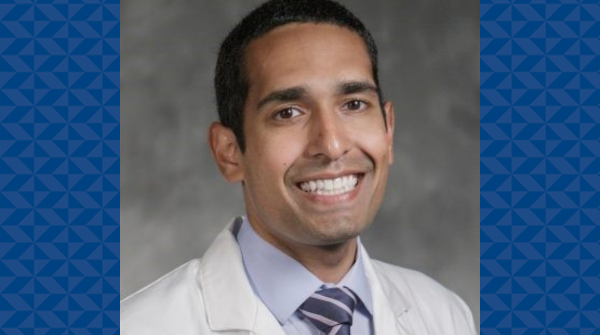
Senthil Selvaraj, MD, MS, MA, has been selected as a recipient of an American Society for Clinical Investigation (ASCI) 2024 Young Physician-Scientist Award (YPSA). The award is a significant early-career achievement and highly competitive with 172 nominations this year for 52 awards.
Dr. Selvaraj, an assistant professor in Cardiology (Advanced Heart Failure and Transplant) at Duke and a faculty member in the Duke Molecular Physiology Institute, is a past recipient of ASCI’s inaugural Emerging-Generation Awards in 2022 while he was at the University of Pennsylvania Perelman School of Medicine. He is mentored by Dr. Svati Shah.
This is the second consecutive year that a faculty member from Duke Heart has earned one of ASCI’s YPSAs. Jennifer Rymer, MD, MBA, received a 2023 ASCI YPSA.
Q: Tell us about your clinical, academic, or research interest and why you are passionate about this topic.
Dr. Selvaraj: I have been grateful to work in a wide spectrum of heart failure-related research over the past 14 years. While my roots are grounded in clinical research, I transitioned to a translational research focus in the past six years during my fellowship. I followed the advice of several mentors to “get out of my comfort zone” and explore something new. In that regard, I started reading more of the basic science literature in heart failure and was inspired by burgeoning data that explored manipulating metabolism and myocardial fuel utilization as a therapeutic avenue.
In keeping with my longer-standing appreciation for clinical trials and randomization, I sought to combine cardiovascular metabolism and trials through early phase work. As such, my efforts have focused on understanding the relevance of modulating cardiovascular metabolism for potential benefit, and I have found a wonderful home at Duke to perform this work when I transitioned to faculty two years ago. In doing so, I am deeply indebted to Dr. Svati Shah who has broad expertise in cardiovascular metabolism and mentored me in this journey.
Q: Can you speak more about the focus of your work?
Dr. Selvaraj: My research program employs early phase clinical trials combined with deep phenotyping to decipher metabolic mechanisms that may be leveraged for cardiovascular benefit. These studies characterize dynamic changes in exercise physiology, biomarker profiles integrating metabolomic platforms, echocardiography, arterial stiffness, metabolic molecular imaging techniques, and several other modalities.
More recently, this line of inquiry has explored the potential benefits of ketogenic therapies either derived endogenously (ketogenic diet and SGLT2 inhibitors) or exogenously (oral ketone solutions) among patients with heart failure. As examples, we have two phase I clinical trials as well as three phase II clinical trials (either recently completed or currently underway) centered on using different methods of ketosis to alter cardiovascular metabolism and/or physiology. Complementary exploratory work is also grounded in fundamental data on fuel utilization in patients across the spectrum of cardiovascular disease.
Q: How does your work improve health outcomes in our communities?
Dr. Selvaraj: Early phase work is foundational to understanding novel mechanisms that may afford benefit. Our goal is to understand ways and reasons by which modulating cardiovascular metabolism may be beneficial in patients with heart failure, though the paradigms employed in these studies can be broadly applied to other fields outside of heart failure specifically. Our phase II clinical trials are centered around patient-centered outcomes (exercise capacity) and we hope that we will identify novel ways to improve exercise tolerance in heart failure (as physical activity limitation is a defining feature of the syndrome).
Q: How does your work move medicine forward?
Dr. Selvaraj: My hope is that this line of inquiry feeds broader efforts to understand ways in which cardiovascular metabolism may be a viable treatment paradigm in heart failure. Novel drugs typically considered “metabolic” therapies such as SGLT2 inhibitors or GLP-1 agonists are becoming (or have become) pillars of therapy in heart failure, lending credence to this idea. Pending this early phase work, I would be delighted to see these ideas move toward larger (phase III) clinical trials.
Q: How does the award support your work and career going forward?
Dr. Selvaraj: I am grateful for this recognition from the ASCI and to join this group of passionate physician-scientists. The ability to join this community facilitates important connections and provides early-career specific programming on topics fundamental to progressing as a physician-scientist. Obtaining independent funding has become harder over time, making programs like this very valuable to career development.